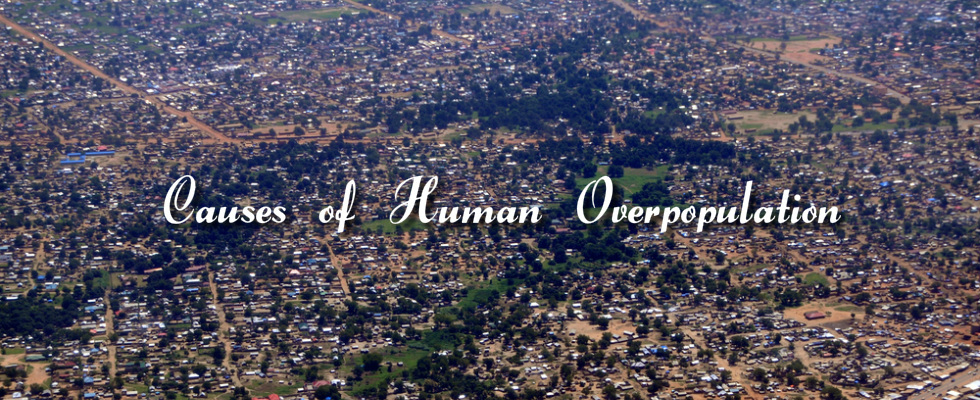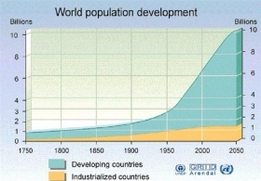
Causes of Human Overpopulation
With
over 7 billion people living on the planet today
and estimates reaching
between 8 and 11 billion by 2050
and
up to 15 billion by 2100, the human population will continue to grow exponentially. Almost all of this growth will take place in developing countries,
where today's 5.3 billion population of less developed regions is expected to increase to 7.8 billion by 2050. The population of developed countries
will remain largely unchanged, at 1.2 billion, with the exception of the U.S. population,
which is expected to grow by 44% from 2008 to 2050. How is this human population explosion possible? Medical advancements, increases in agricultural productivity, poverty and lack of education and family planning are the main reasons. There has been a
decline in mortality rates
and a
rise in birth rates, largely due to medical advances, which have provided more effective ways to control epidemics, better measures to treat critical health ailments, more effective solutions to infertility problems and safer pregnancies. Advancements in medicine have also led to an
increase in the average life expectancy of humans
and
good prenatal care, health care, education and development programs have improved the chances of survival for both the mother and the baby. There are also social pressures, mostly from families, to have children and increased early marriages, which increases the chances of having more children; especially with an uneducated class where family planning is often not present. Moreover, modern methods of birth control and family planning usually don't reach the illiterate populations of society and some cultures promote beliefs and expectations to marry at a certain age or have a certain number of children.
Intensive farming practices,
including an immense use of genetically modified foods, have also played a significant role in allowing the current growth of the human population and will likely continue to play such a role in the future. Finally, immigration, which may not affect the overall world population figure,
can lead to localized overpopulation and cause an uneven distribution of natural resources.
Learn more.
"Solving the population problem is not going to solve the problems of racism… of sexism… of religious intolerance… of war… of gross economic inequality—But if you don’t solve the population problem, you’re not going to solve any of those problems. Whatever problem you’re interested in, you’re not going to solve it unless you also solve the population problem. Whatever your cause, it’s a lost cause without population control." ~ Paul R. Ehrlich, The Population Bomb
The Big Picture


Growth image via University of North Carolina
"We must alert and organise the world's people to pressure world leaders to take specific steps to solve the two root causes of our environmental crises - exploding population growth and wasteful consumption of irreplaceable resources. Overconsumption and overpopulation underlie every environmental problem we face today."
~ Captain Jacques-Yves Cousteau
~ Captain Jacques-Yves Cousteau
| |
"About 80 million people are added to the earth's population each year. Reducing the rate of population growth eases the many pressures people place on natural resources, wildlife habitats, and the atmosphere. Approximately 222 million women around the world would like to delay or end childbearing but have no access to contraception. Family planning improves maternal and infant health and allows women to be more active in society. The 50 poorest countries on earth are also those with the highest fertility rates. Rapid population growth hinders progress on all Millennium Development Goals. Voluntary family planning improves everyone's quality of life." ~ Population Connection




